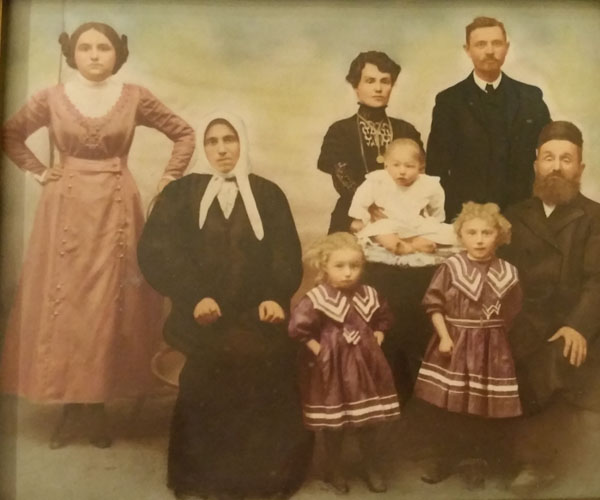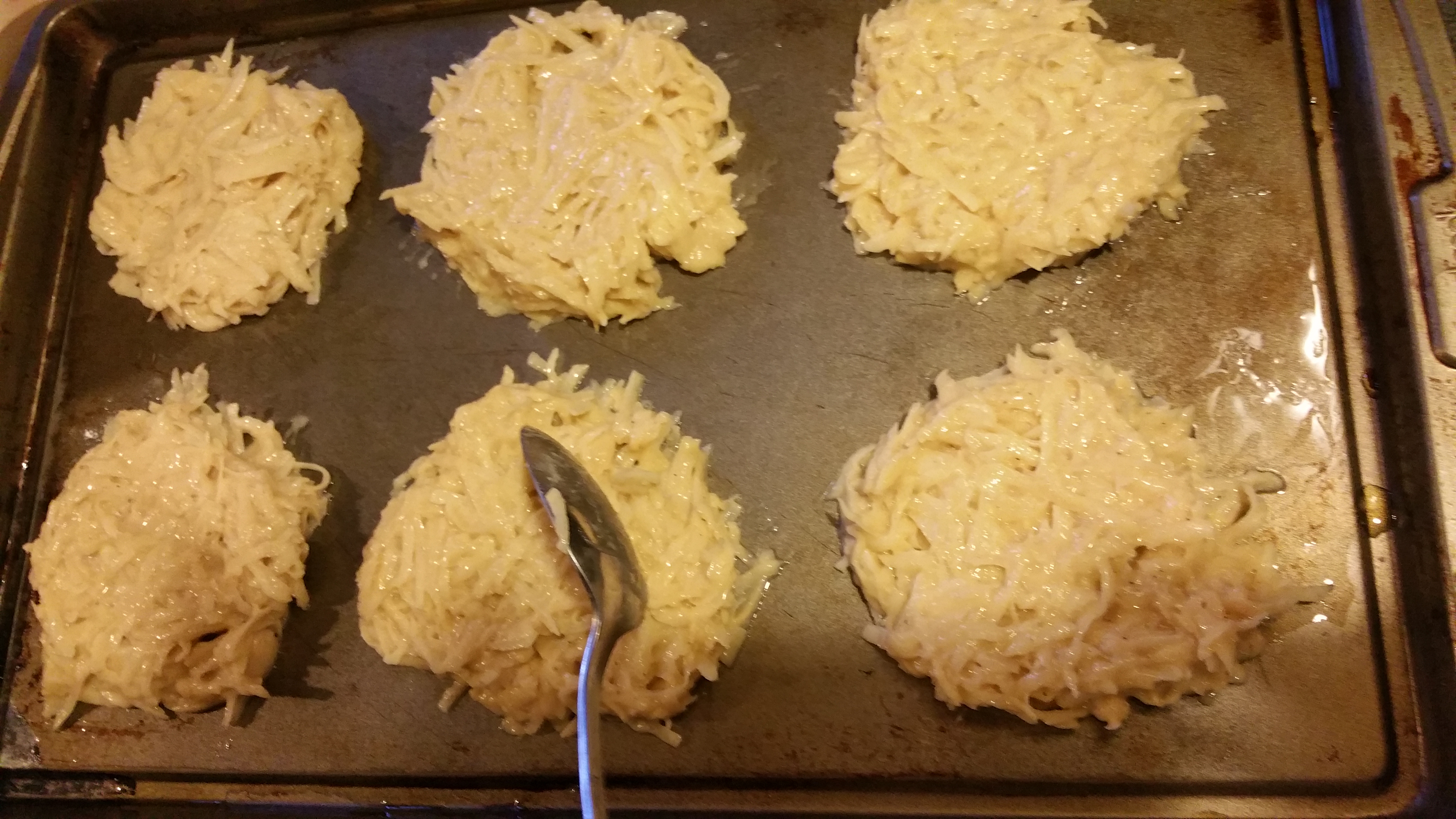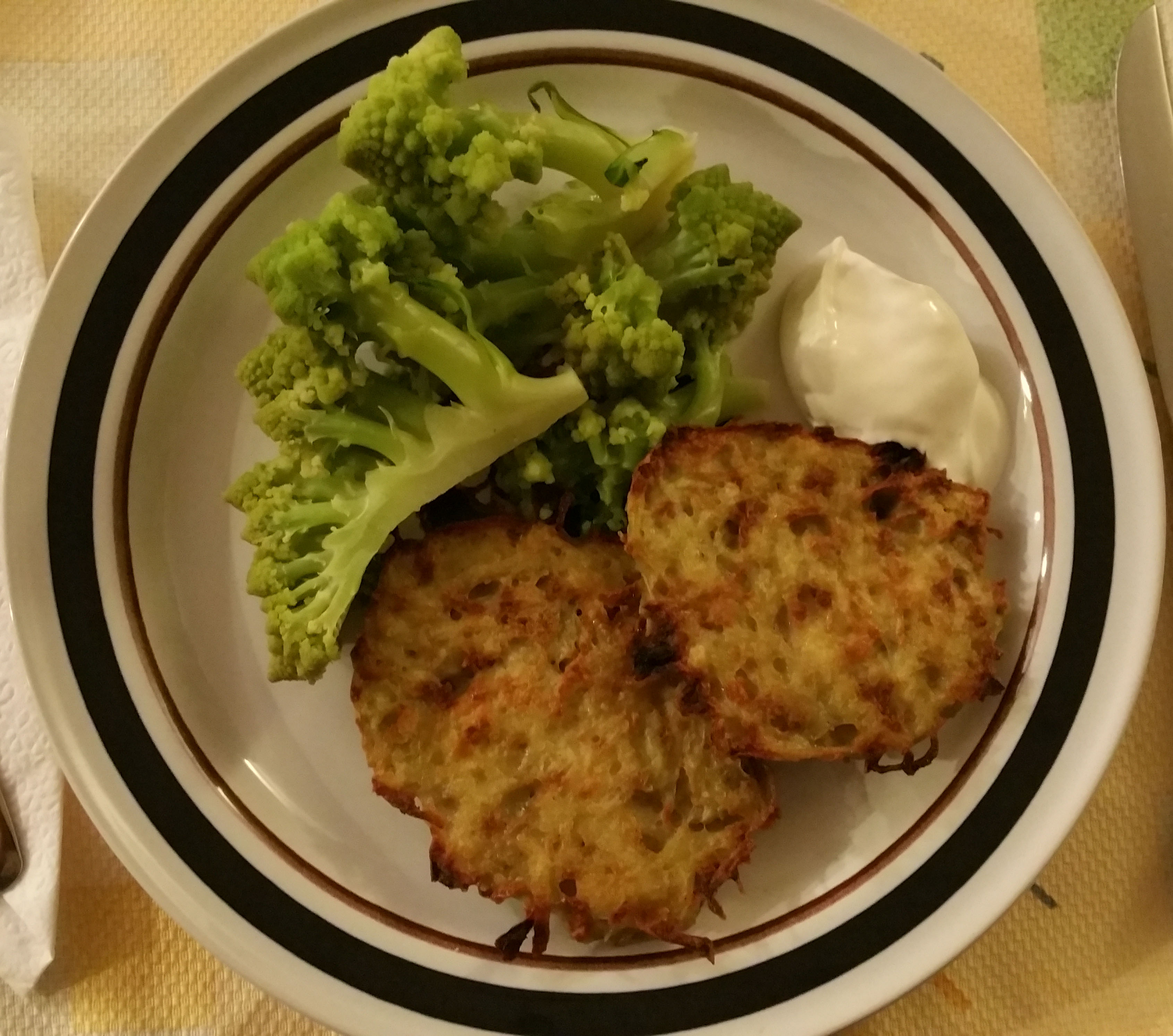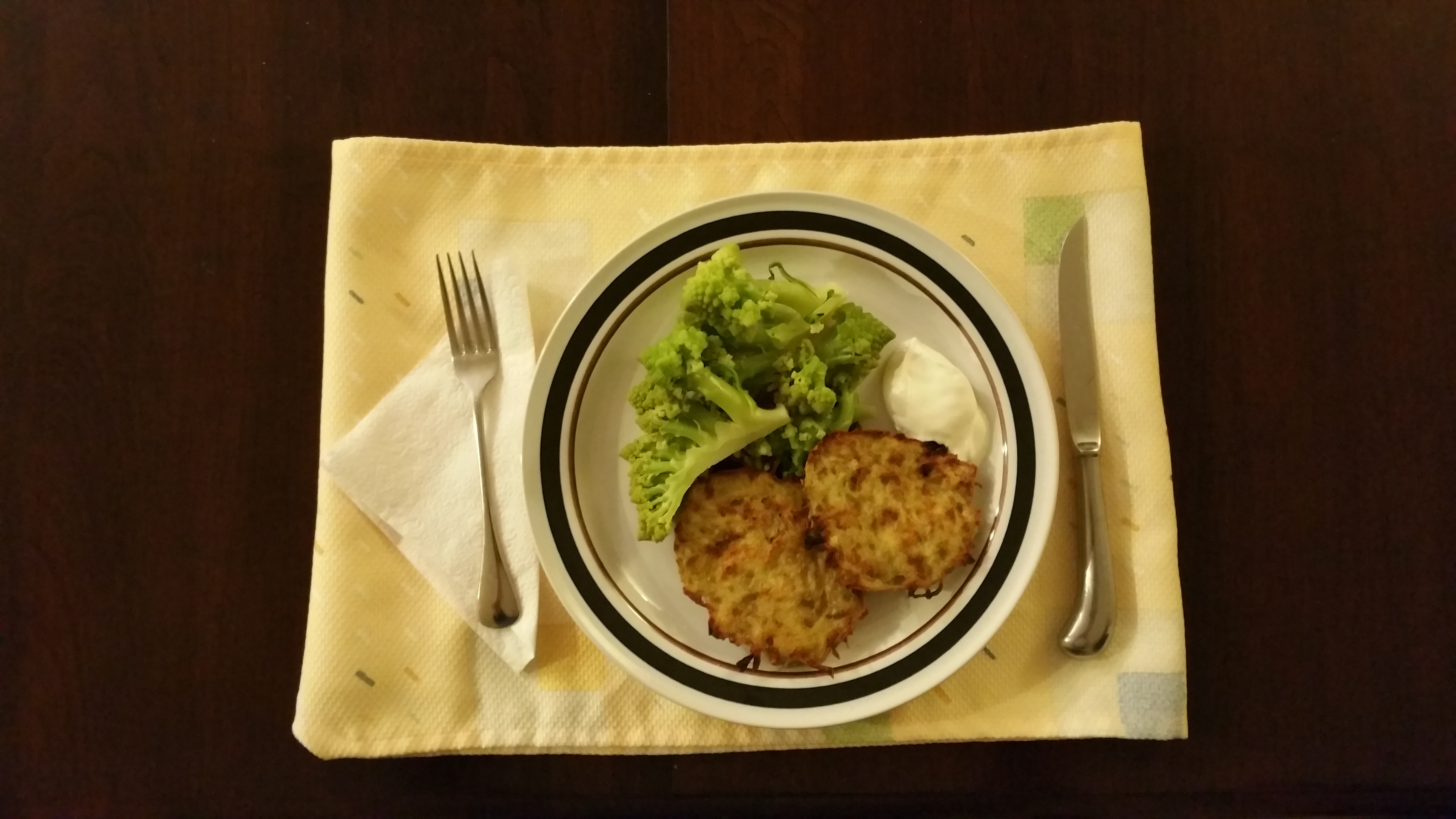Bubbi’s Potato Pancake Recipe
From Russia with Love. Wasn’t that a movie? Why, yes it was! It was a 1963 James Bond thriller/action movie from Ian Fleming’s book by the same title. Sean Connery starred as agent 007. I was a Bond fan, as was most of my family. So this recipe for potato pancakes was a passed down from my Russian grandmother to us with love. She loved to make them for us and share the family stories from Russia that went with the meals she served to us. I loved to listen to her interesting stories about her family! Some were hard to listen to and imagine; others were quite pleasant and entertaining. They were about her life and growing up at the turn of the century during the Russian revolution. She and only two other surviving siblings (out of 11) survived the revolution and came to the United States. If you’ve ever seen the movie “Fiddler on the Roof,” the story of her immigration from Russia was similar to that.
Pictured below from left to right: My grandmother at age 18 in the pink dress, her mother seated (Martha Kaplinovich), her sister Bessie and her husband Avrum, and their three children, (Jenny, Hymey, and Esther). Her father is seated on the far right with the beard and hat. This photo was originally in black and white, my mother had it colorized for her home sometime around 1974. The photo is circa 1920

I would go over to her house when I was very young because we lived nearby. I loved to have breakfast with her! She lived in a grey house with a side porch that she called the piazza. She was a petite woman with an erect bearing that commanded respect. In English Her name was Rose, and I always think of her when I see roses, even to this day. In Russian , Rose is translated to “Rhazelle,” or “Roza”. In Yiddish which was the European version of Hebrew it was “Royz”. In any language she loved roses. You see, there were rose bushes on the slope beside the stairs that went to the piazza door. When it was spring time, I could smell their fragrance as I waited for her to answer the door. Peering through the kitchen window, she’d turn her head this way and that to make out whose face was behind the lace curtain. She always wore an expression of apprehension until she saw it was me. Then, I would hear multiple clicks of lock after lock as she unbarred the door that protected her from a decaying neighborhood, where she had been broken into once while she was home. The break-in happened in the early 1970s. The robbers tied her, my grandfather, and Aunt Ruthie up, and stole what they could get. It broke my heart to hear about this, but I was so grateful they were all okay. Thank God the thieves didn’t hurt them.
Back to my visit. As she answered the door, she would give me the biggest smile and called me her Iris’l. This was her Russian/Yiddish pet name for me. (My other siblings had pet names from her, too.) Then this tiny woman would hug me as I looked up at her. She had a teased coif (hairdo) that looked like brown cotton candy–the style of the day. People back then said she resembled Rose Kennedy. It was a major compliment to be told you look like the President’s mother. We called her “our Bubbi,” which means grandmother in Yiddish. True spelling of that is “Bobe” . She always dressed well. As I grew up, she always told me how nice and pretty I looked. With a knitted brow and holding me at arms length for a good look, she would say in a heavy Russian accent,”Iris’l , you look so pretty in your new outfit, but you are too skinny.” I had Celiac disease to thank for that! “Come sit on the piazza and I will get you a nosh! What would you like?” The choices were sponge cake, mundlebread, poppy seed cookies, and even wheatena cereal. I loved all of these, but they all contained wheat. No wonder I felt so sick after leaving her home! I used to question why I never felt well around meal times.
Bubbi and I would sit and visit and she would share some of her cooking thoughts with me. I would first answer her questions until the conversation turned to the past, as it did so often. These were the stories I loved to hear–those about relatives I never met and about the Russia she fled as a young girl. Then, I would ask a question of my own, such as: “What was the name of the village where you grew up, Bubbi?” I always listened so carefully, because I loved her and felt what she felt, even at a young age. Her spoken English was still very poor, and she couldn’t read English. She had newspapers delivered to her home that were in Russian or Yiddish. The Italians I knew also got newspapers from Italy or locally news translated into Italian. As a youngster I learned to read Italian that way, inspired by my father’s mother! Back then, there were so many immigrants from Russia, Italy etc. that they made newspapers available to people who couldn’t read English.
Anyway, back to Bubbi sharing with me. “I grew up in the village of Zaslavl near the city of Minsk,” she told me. “I was a beauty then, though you might not guess it now.” Hey, was she kidding? She was a dead ringer for Rose Kennedy! She’d laugh when I would remind her of that. She then said, “Anyway, I was just coming of age prior to the Russian revolution. I had a big family of 11 brothers and sisters but only 3 of us lived to grow old. I know it sounds hard, and it was. There were no antibiotics or shots for polio or measles. It was hard to get enough food for the whole family and to keep warm and dry in the bitter Russian winters. To look at me, I was just a little bit, but I was a healthy strong girl. My cheeks were pink, and I had thick dark hair that hung down all the way to my waist. All my sisters were jealous of my hair. I used to wear it in two braids crisscrossed across the top of my head like a queen’s crown. I had the family’s dark eyes, and I used them to tease all the boys my age.” Bubbi you cad, I thought! It was hard to picture my grandmother teasing boys, but I continued to listen while smirking to myself. She said she only did it for fun, because there was only one boy she really loved and wanted to marry. His name was Maiche, which translated in English was “Morris.” She went on to tell me that they had known each other since childhood, and he was always her favorite. He even talked of marrying her when she was in her late teens. He didn’t want to live without her. Through her, I learned what to look for in real true love that would last!
Unfortunately, while she and Maiche were thinking marrying, political tensions in Russia were mounting. Life for Russian Jews became increasingly difficult. There were “pogroms” in all the villages. “Pogrom” is a Yiddish term for an organized massacre of helpless people. It was terrifying for me to hear Bubbi’s account of this at times. The Gentiles organized pogroms against all the Russian Jews. She described how they stampeded into her village on huge horses like in the movie, “Fiddler on the Roof.” The galloping of the horses sounded like a horrific thunder. The dust they kicked up looked like a tornado coming to destroy them. They looted the Jewish shops, burned Jewish homes, and raped the Jewish women. They took whatever they wanted and killed anyone who got in the way. My great-grandmother had asthma, and she had a bad attack during one of the raids in her village. My great-grandfather (Bubbi’s father) couldn’t do anything for her during the chaos. There were no doctors around–there was only chaos. There was no one to help her, so she died. I have asthma myself, and can’t imagine this! I have woken in the middle of the night gasping for air, but I had an inhaler. I hate the thought that my great-grandmother died that way. When my grandmother told the story, I could see it still affected her.
After my great-grandmother’s death, my great-grandfather decided it was time to leave Russia. He’d seen too many of his family members die. He wanted a better life for the remaining children, so he began making plans for escape. So to not be noticed, my grandmother and her brothers and sisters were taken one by one to the Poland border by guides her father paid. They were smuggled across into Poland in a small band with other Jews who were also desperate to escape. My grandmother was one of the first in the family to make the trip. After crossing the border, she made her way to Warsaw where she waited for the rest of her family. Warsaw was like heaven compared to where they had been. It was beautiful without any soldiers. The streets near the train station were paved with beautiful tiles. There were great opera houses and fine museums. The streets were full of colorful markets filled with food and trinkets. There was music and theater. It was like a new city compared to the old village she had left behind. She waited 13 months in Warsaw for her family. “It would have been a wonderful time,” she told me except that she was preoccupied worrying about her family! She wondered if she would ever see them again.
Finally they came and were all together again. Her older sister, Bessie, had the hardest time of them all. She had been married by then with a home of her own. All the plans were in place, the guide was waiting, and the bags were packed. The night before her turn to leave, the Russian soldiers got wind of her plan and raided her home. They opened all her luggage and took anything and everything they wanted–silver that had been in the family for generations, jewelry, candlesticks, and handmade linens covered with embroidery and lace that were the pride of her household. Then, the soldiers almost beat Bessie to death as her children watched. My grandmother said, “she was lucky they didn’t rape or kill her.” She was in prison for two weeks and then released. Eventually, she and her children were able to join my grandmother in Warsaw. From Warsaw they traveled to Paris, and from Paris went on to Holland where they boarded a ship sailing for Ellis Island with many other emigrants alike. The further they got away from Russia, the safer they felt. But, they weren’t to America yet. The ship they sailed on was dirty, and it was crowded. Many people were sick. Day after day the waves of the sea tossed them to and fro. My grandmother said it was hard to sleep. There was food for them, but it was terrible! She said she liked to stand on deck and look for land because the hold of the ship smelled so bad. She couldn’t wait to see the country where she and her family would be safe at last. My grandmother was only 18 years old when she experienced coming to America on such an arduous journey. No wonder she was so strong. She had to be. As I listened to her tell this story, it was hard to understand every word, because her English was so poor. But, I was both fascinated by the stories and chilled to realize these things really happened to people in my family. And I thought a burst appendix and Celiac disease was bad! What was I complaining about?
In New York City at Ellis Island, they were detained for 6 weeks while they were screened for diseases, etc. They then traveled to Boston to start a new life. She found work as a seamstress in a garment factory. Then, she met my grandfather (Joseph Millman). They married and had two daughters (my mother and Aunt Ruthie). Even though she loved Joseph, she never forgot Morris. They were separated during the revolution, and she had no idea if he survived. She never forgot the friends and neighbors and family members lost. This is making a long story short, to say the least, because I could literally write a whole book on my grandmother’s life and her incredible story. My grandmother lived with Joseph until my mother was 10 years old in May 1942. That day, it was a sunny afternoon. While my grandmother was at work, my grandfather was heading up the street where they lived to go home. At the same time my mother was playing with a friend nearby. Suddenly there were fire engines and my mother and her friend ran up the street to see what it was happening. On the way, she met her father. He stopped her and took her by the hand. As they approached their home, they soon realized that it was on fire. In all the excitement, my grandfather fell dead of a heart attack while holding my mothers hand. She kept trying to shake him to wake him up. But he never responded! The impact that this had on my mother was lifelong. She never got over the feeling of abandonment after that. She loved her father, and it hurt her deeply that he died right in front of her. My mother was also a strong woman as a result. Hardships in life can either make or break us. My mother and grandmother chose strength, and moving on over crumbling due to hardship. I am so grateful for these role models in my life, where giving in to weakness was never a thought!
To continue, my grandmother went on to raise her two daughters and work hard in Boston. Later on, around the time my mother was 27 and married with children of her own, another interesting thing occurred. She was walking to work one morning. As she was beginning to open the door to the factory she looked down the street, and noticed a man walking toward who looked vaguely familiar. She walked toward him and, as she got closer, he recognized her. Her mouth dropped. It was Morris, her old love, from Russia. Well, they immediately realized (through just a few words) that they were both widowed with children. They agreed to meet after she got off work. Was this coincidence–that he had been recently widowed also? I doubt it! My grandmother was a praying, God-fearing woman. This was God’s answer to her prayers! You know, they fell back in love and soon married. They were in their 50’s by then. Morris was well to do in a fur business that he had worked hard for. Nothing was handed to either one of them. And you know, he took very good care of my grandmother for the remainder of her years. And, my grandmother never had to work again. Finally, she reached a place of peace and rest provided by the man she never forgot and always wanted to marry. Fairy tales really can come true! She went on to make many “potato Latkes” as they called them, and here is her amazing recipe. It is simple, passed onto me from Russia with love and through several generations to mine! My grandmother was my 007 agent. Thanks for allowing me to share!


POTATO LATKES (PANCAKES)
Ingredients:
4 large russet potatoes
1 small grated onion (or onion powder sprinkled in)
2 eggs
1/3 cup of gluten-free flour mix
Olive oil to coat cookie sheet with (or vegetable oil for frying if you choose to fry the pancakes)
Pepper
Directions:
1. Preheat oven to 350 degrees.
2. Shred all 4 potatoes with a hand vegetable grater or food processor. Place into a mixing bowl.
3. Beat the eggs together well.
4. Add grated onion or onion powder, mix together well.
5. Then add the flour mix and stir till smooth as possible.
6. Add the grated potatoes to mix and fold in well. Add a sprinkle of pepper and mix in.
7. Spoon potato mixture (measuring about a half cup) onto cookie sheet. Flatten to about 4-inch round cakes.
8. Bake 30 minutes turning once after 15 minutes.
9. At the end you can broil for just a few moments to crisp them up.
Variation: If you prefer to fry them:
In a large skillet, heat stove to medium heat, drop potato mixture in pan to form 1/2 cup measurement of cakes like instructed in baking. Flatten cakes till they are round, but not too thick. Cook until golden brown about 4-5 minutes. Turn once and cook an additional 4-5 minutes. Cook until crispy.
Serve with sour cream, a favorite meat, and vegetable.
The latkes are also good served with applesauce in place of the sour cream. My family has used both.
These can also be served as a breakfast dish with white fish, scrambled eggs, and a favorite fruit.



Recent Comments